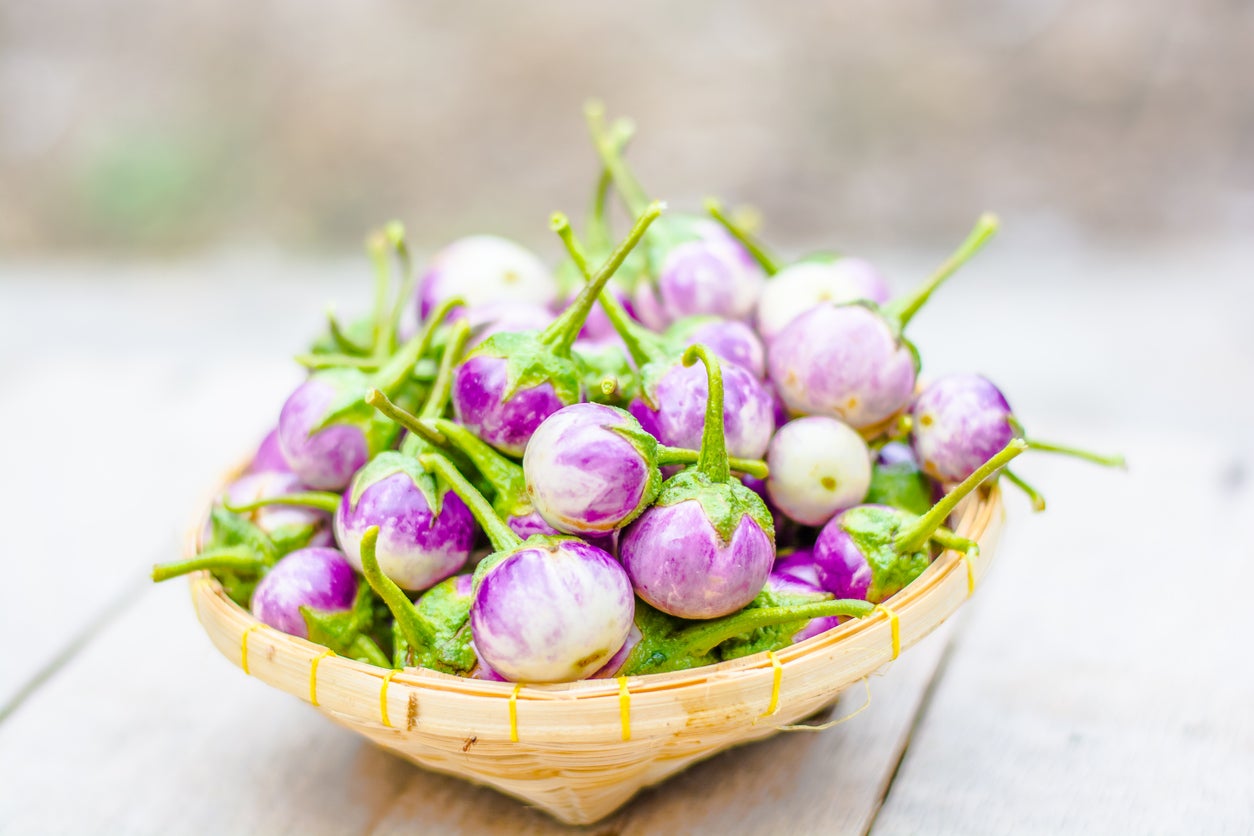Growing Indian Eggplants: Learn About Common Indian Eggplant Varieties


As the name suggests, Indian eggplants are native to the warm climate of India, where they grow wild. In recent years, the small egg-shaped veggies, also known as baby eggplants, have become highly desired for their mild sweet flavor and creamy texture. The good news is that growing Indian eggplants isn’t difficult, and is much the same as growing other varieties.
Types of Indian Eggplants
Gardeners can choose from several kinds of Indian eggplants. Here are a few of the most popular Indian eggplant cultivars:
- Black Chu Chu hybrid, which produces small rounded fruits, is one of the newer Indian eggplant varieties.
- Red Chu Chu hybrid is an egg-shaped, bright reddish-purple eggplant.
- Calliope is an attractive oval eggplant with purple and white streaks.
- Apsara is one of the newest kinds of Indian eggplants. It produces rounded purple fruit with contrasting white stripes.
- Bharata Star is a high-yielding plant that produces rounded purple-black fruit in 60-70 days.
- Harabegan hybrid is an unusual eggplant with long, narrow, pale green fruit and few seeds.
- Raavayya hybrid is among the most popular Indian eggplant cultivars. It produces egg-shaped fruit with attractive reddish-purple skin.
- Raja hybrid is a unique white eggplant with a rounded shape.
- Udumalpet produces pretty pale green, goose-egg shaped fruit with purple streaks.
Growing Indian Eggplants
The easiest way to begin growing Indian eggplant is to purchase young plants in spring. You can also start seeds indoors six to nine weeks ahead of time. Indian eggplant is a tropical plant and doesn’t tolerate cold temperatures. Don’t move plants outdoors until all danger of frost has passed and daytime temperatures are at least 65 F. (18 C.).
Indian eggplant likes fertile, well-drained soil. Dig in a generous amount of compost, well-rotted manure or other organic material before planting. Mulch the plants well to keep the soil moist and discourage growth of weeds.
Provide Indian eggplants with at least an inch (2.5 cm.) of water per week. Deep watering is healthier and produces strong roots. Avoid frequent, shallow watering.
Indian eggplant is a heavy feeder. Apply a balanced fertilizer at planting time, and again shortly after fruit appears.
Weed around eggplants frequently, as weeds will rob moisture and nutrients from the plants.
Gardening tips, videos, info and more delivered right to your inbox!
Sign up for the Gardening Know How newsletter today and receive a free copy of our e-book "How to Grow Delicious Tomatoes".

A Credentialed Garden Writer, Mary H. Dyer was with Gardening Know How in the very beginning, publishing articles as early as 2007.
-
 Looking For Plants To Give You The Soft And Fuzzies? Try These 5 Fuzzy Leaf Plant Options
Looking For Plants To Give You The Soft And Fuzzies? Try These 5 Fuzzy Leaf Plant OptionsLovers of texture, drama, silver foliage and tactile plants will adore these special sensory garden additions. These fuzzy leaf plant options will leave you all aglow
By Susan Albert
-
 Get Ready For A Summer Of Hummers! Grow These Full Sun Hummingbird Plants and Flowers
Get Ready For A Summer Of Hummers! Grow These Full Sun Hummingbird Plants and FlowersIf you’re lucky enough to enjoy a sunny backyard, make sure you are maxing out on your pollinator opportunities and grow these full sun hummingbird plants and flowers
By Tonya Barnett